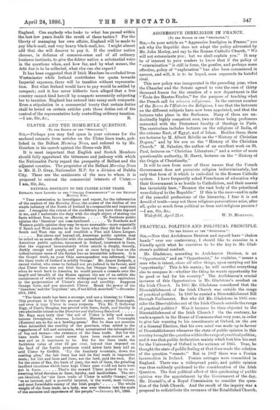ULSTER AND THE HOME-RULE QUESTION. I To THE EDITOR OF
THE "SPECTATOR."] SIR,—Perhaps you may find space in your columns for the -enclosed extracts from articles on the Ulster linen trade, pub- lished in the Belfast Morning News, and referred to by Mr. Goschen in his speech against the Home-rule Bill.
It is most important that English and Scotch Members should fully apprehend the bitterness and jealousy with which the Nationalist Party regard the prosperity of Belfast and the adjacent counties. The proprietor of the Belfast Morning News is Mr. E. D. Gray, Nationalist M.P. for a division of Dublin City. These are the sentiments of the men to whom it is proposed to entrust the commercial interests of Ulster.—
NATIONAL HOSTILITY TO THE ULSTER LINEN TRADE.
EXTRACTS FROM LETTERS OF THE " SPECIAL COMMISSIONER" OF THE BELFAST
Morning Netts.
" Your commission to investigate and report, for the information of the readers of the Morning News, the causes of the decline of the staple industry of the North of Ireland is a responsible and important one. I recognise the extent of the confidence you have thus reposed in me, and I undertake the duty with the single object of stating the facts without fear, favour, or affection To Northern publics opinion the • linenites' are case-hardened To Southern and Western public opinion they may be more amenable—more especially if South and West resolve to do for linen what they did for land—if South and West rise up and establish a Flax and Linen League.
But above and beyond all, American public opinion may -be relied on as most effective with the nnteaohable linenites.' Show American publics opinion, interested in Ireland, interested in linen, that the supposed immaculately white article is deeply, densely, darkly orange and purple, and you at once bring to bear on the indiscriminate users of the Syrian hue an irresistible influence. It is the Gospel truth, as your Ohio correspondent was informed, 'that the linen trade of Ireland is solidly Orange.' Mr. James Redpath, a casual visitor, who came to Ireland not prejudiced in its favour, said that Ulster linen was not Irish linen, but Orange linen ; and that when he went back to America ho would preach a crusade over the length and breadth of the States against the use of an article" the sustainment of which and whose widespread vogue were equivalent to the perpetuation of Ulster's slavery and servility. Suppress Orange linen, and you manumit Ulster. Break the power of the linenites,' and the 'Loyalists' are, if not kil!ed, scotched."—December 29th, 1884.
"The linen trade has been a scourge, and not a blessing, to Ulster. This province is by far the poorest of the four, except Connaught, and even it tops Ulster in many respects. This Mr. T. Galloway Rigg, of Castle Douglas, has proved with force, finish, and finality in
two admirable letters to the Dumfries and Galloway Standard Mr. Rigg says truly that 'the soil of Ulster is hilly and moun- tainous throughout, whereas Leinster, Munster, and Connaught {Eastern) are as flat as a bowling-green: But he does not mention what intensified the sterility of the province, what added to the raggedness of hill and mountain, what accentuated the inhospitality -of bog and morass—the existence of the linen trade. But for the linen trade Ulster could never have been rack-rented as it was and as it continues to be. But for the linen trade the factitious value of over 25 per cent. beyond that imposed on the land of the fertile provinces could never have been laid on
arid Ulster by Griffith. Up the heathery mountain, down the rustling glen,' the fair linen has laid its foal mark in impossible rents ; for lint and loom and linen, not the land, paid the rent. But for the stone of flax, the bank of yarn, the web of linen, the grinding landlord exactions which have kept Ulster poor could not have been
put in force That's the reward Ulster gained by its un- swerving blind devotion to linen, loyalty, and landlordism. The trio are identical, for the linen trade of Ulster is solidly Orange,' and 'as an interest, and a powerful interest, is the worst, most vicious, and most formidable enemy of the Irish people.' The whole weight of the linen trade, as a body, was ever thrown into the scale of the enemies and oppressors of the people."—Januory 5th, 1885.


































 Previous page
Previous page